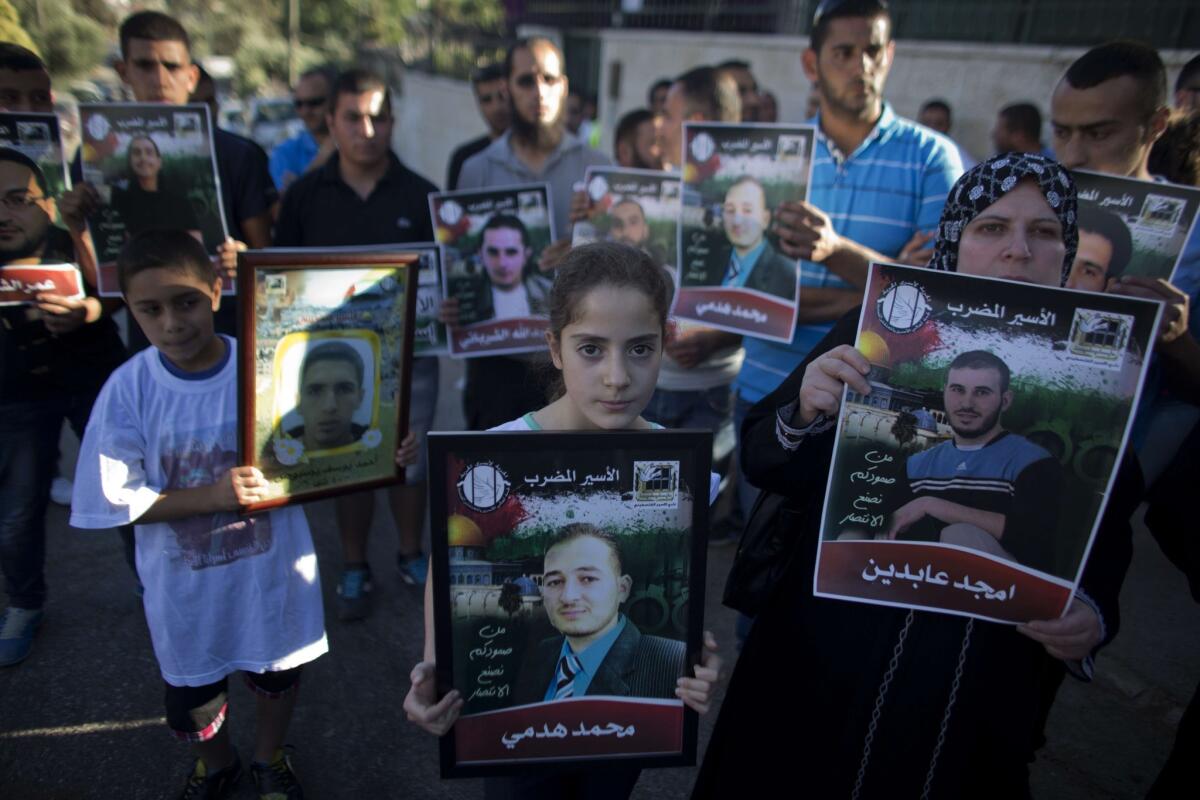Palestinian prisoners halt hunger-strike as force-feeding law nears OK

- Share via
Reporting from Jerusalem — Dozens of Palestinian prisoners have halted a two-month hunger strike after reaching an undisclosed agreement with Israeli Prison Service authorities, even as Israeli lawmakers continue to push a controversial bill to allow forced feedings.
The strike was started by about 80 prisoners protesting their detention as administrative detainees — held without charges or trial for months or years with no set date for release.
Dozens more Palestinian prisoners joined in at different stages of the strike, demanding that Israel cease the controversial jailing practice. About 75 of the striking prisoners remain in civilian hospitals across Israel for medical care.
Israeli media reported that the deal was a “short-term” agreement exempting administrative detainees from wearing prison uniforms, revoking fines on the strikers and allowing them family visits every two weeks.
In a press conference in Ramallah on Wednesday, Palestinian Authority minister of prisoners’ affairs Shawqi al-Ayaseh said the prisoners had “suspended” their strike but would resume it if prison authorities do not keep their word.
Neither side disclosed details of the agreement, but Israeli Prime Minister Benjamin Netanyahu said he was satisfied with the resolution of the strike.
“We took a clear policy which led to this important result and we will now add other means so that there will be fewer prisoners’ strikes in the future,” Netanyahu said during a meeting with Italian Senate President Pietro Grasso on Wednesday.
“We are not talking about a major clear victory,” said Quaddoura Faris, head of the Palestinian Prisoner’s Club.
Unrelated to the strike, prison authorities recently announced that they would withhold newspapers and access to World Cup broadcasts to Palestinian prisoners who are members of the Islamist militant group Hamas.
The stated objective of the strike was to protest administrative detention, under which about 200 Palestinian prisoners are now detained. Israeli army authorities are reportedly seeking similar status for another 200 Palestinians, about half of whom were recently arrested during the search for three missing Israeli teens.
Roughly 5,000 Palestinians are currently being held in Israeli jails.
Periodic hunger-strikes staged by Palestinian prisoners have posed a challenge to prison authorities and have been a political headache for Israel.
An eight-month strike a couple of years ago by prisoner Samer Issawi drew international attention when he came close to death. Released in December, Issawi was detained again last week.
The ‘other means’ Netanyahu referred to include a bill that would allow judges to permit forced feeding of hunger-striking prisoners deemed to be in a life-threatening medical situation. It was expedited against the backdrop of the current hunger strike and Israel’s operation in the West Bank. Lawmaker Miri Regev, of Netanyahu’s ruling Likud party, is a driving force behind the bill she described on Wednesday as a “deterrent.”
Prison service doctors will not be forced to carry out the procedure, which has been defined by international medical treaties as torture. Israel’s own medical association has sharply objected to the bill, which is due for a final approval vote in Knesset on Monday.
Sobelman is a special correspondent.
Special correspondent Maher Abukhater in Ramallah contributed to this report.
More to Read
Sign up for Essential California
The most important California stories and recommendations in your inbox every morning.
You may occasionally receive promotional content from the Los Angeles Times.










